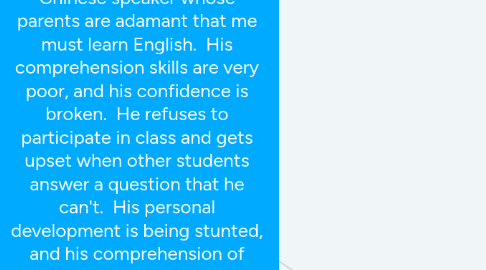
1. Tier 1
1.1. Praise
1.1.1. Praise when good attitude and involvement occur. Being attentive and positive should be recognized and encouraged.
1.1.2. Praise when on task. John constantly allows his mind to wander. Praising him when he stays on task would be a constructive thing to do.
1.1.3. Praise student constantly. A ratio of 4 positives to 1 negative is the most effective ratio. This would give him more confidence in front of his classmates.
1.1.4. Data Tracking Method
1.1.4.1. Self monitoring assignment sheet. I will give John the sheet to see how well he thinks the participated in class on any given day. A score of 1, 2, or 3 should suffice. 1 meaning he does not think he paid attention, to 3 which is the paid attention all class.
1.2. Reward
1.2.1. Simple reward systems. When staying on task for a whole class John could be given a reward card.
1.2.2. Data Tracking Method
1.2.2.1. LiveSchool. An online easily accessible resource to track student reward progress.
1.2.3. A positive note home. The value of a positive note home should not be underestimated. Praise from the parent is always more effective than praise from a teacher.
1.3. Other
1.3.1. Reduce Assignments. John will benefit from not having to do all of the required material. On an assignment like math, John may be required to only do the easier word problems and come in for one on one instruction for the more difficult ones. Soon, he will begin to attempt them by himself.
1.3.2. Organize materials daily. Teaching John to organize his materials will develop a sense of pride in his work. He will be more likely to try harder in class when he has a sense of pride.
1.3.3. Data Tracking Method
1.3.3.1. Simple Behavior Charts. Keeping track of how John does each day will be an effective way to measure progress.
2. Tier 2
2.1. Peer Tutoring. The main problem John has is his reluctance to seem slower than other students. If teaching him to view classmates as a resource to use rather than a threat, he could quickly improve.
2.2. The Praise Game.Classroom misbehavior can reduce time on task and student learning. This intervention can help reinforce positive behaviors. This intervention supports the special needs of Tier II and Tier III students in your class by protecting their self-esteem and avoiding singling them out.
3. Tier 3
3.1. Mentoring. By allowing John to spend time with an individual once a week for about 15 minutes in a relaxed setting we will be able to get more of an insight into how he feels. We will develop a better understanding of his strengths, and they could be incorporated into the lessons to encourage him.
3.1.1. Individual should plan to have a consistent time where John could have this interaction. Consistency is key for improvement.
3.2. Reward System. Any system where children are rewarded, if done consistently and being enough of a challenge, will be effective.
3.2.1. Recognition stickers that John could show his parents would be an excellent idea.
3.3. Peer Tutoring. Continued tutoring could improve understanding, communication, and strengthen the desire to look for help, rather than be afraid to show weakness.
3.3.1. Main Considerations:
3.3.1.1. The student that is tutoring must get along with John. Pairing up students that do not like each other would lead to further conflict.
3.3.1.2. The student that is tutoring must be able to explain the material in a simple, respectful manner.
3.3.2. Behavior Contract. during a parent teacher conference, I will present the contract and explain the situation. The demands will not be too strenuous, just a gentle reminder that John needs to push himself in class. Behavior Management Forms for Teachers

